
Epsom is a town in the borough of Epsom and Ewell in Surrey, England, about 14 miles south of central London. The town is first recorded as Ebesham in the 10th century and its name probably derives from that of a Saxon landowner. The earliest evidence of human activity is from the mid-Bronze Age, but the modern settlement probably grew up in the area surrounding St Martin's Church in the 6th or 7th centuries and the street pattern is thought to have become established in the Middle Ages. Today the High Street is dominated by the clock tower, which was erected in 1847–8.

The Hogsmill River in Surrey and Greater London, England, is a small chalk stream tributary of the River Thames. It rises in Ewell and flows into the Thames at Kingston upon Thames on the lowest non-tidal reach, that above Teddington Lock.
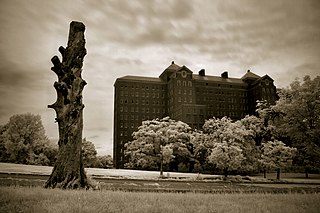
The Kings Park Psychiatric Center, known by Kings Park locals as "The Psych Center", is a former state-run psychiatric hospital located in Kings Park, New York. It operated from 1885 until 1996, when the State of New York closed the facility, releasing its few remaining patients or transferring them to the still-operational Pilgrim Psychiatric Center.

Friern Hospital was a psychiatric hospital in the parish of Friern Barnet close to a crossroads which had a hamlet known as Colney Hatch. In 1965, it became part of the London Borough of Barnet and in the early 21st century was converted to residential housing as Princess Park Manor and Friern Village. The hospital was built as the Second Middlesex County Asylum and was in operation from 1851 to 1993. After the County of London was created in 1889 it continued to serve much of Middlesex and of the newer county, London. During much of this time its smaller prototype Hanwell Asylum also operated.

Ewell is a town in the borough of Epsom and Ewell in Surrey, England. It is approximately 12 miles (19 km) south of central London and 2 miles (3.2 km) northeast of Epsom. In the 2011 Census, the town had a population of 34,872. The majority of which (73%) is in the ABC1 social class, except the Ruxley Ward that is C2DE.
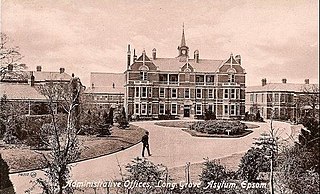
Long Grove Hospital, formerly Long Grove Asylum, was a mental hospital, part of the Epsom Cluster of hospitals in the Horton area of Epsom, Surrey in the United Kingdom.
Stoneleigh is a suburban village in the Epsom and Ewell borough in the county of Surrey, England. It is situated approximately 11 miles (18 km) from central London. In the 2011 Census, the population was 8,741.
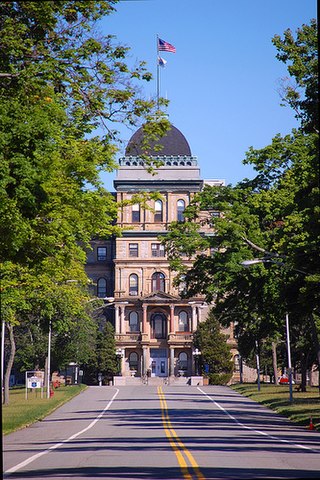
Greystone Park Psychiatric Hospital referred to both the former psychiatric hospital and the historic building that it occupied in Morris Plains, New Jersey. Built in 1876, the facility was built to alleviate overcrowding at the state's only other "lunatic asylum" located in Trenton, New Jersey.
Horton is a village in the borough of Epsom and Ewell, in the county of Surrey, England. It is situated between the towns and villages of Epsom, West Ewell, Chessington and Malden Rushett. Its principal road is Horton Lane, which runs the length of the area between West Ewell and Epsom Common. Horton Country Park also runs along the length of the area, between Epsom Common and West Ewell.
The Horton Light Railway had its origins in a contractor's line built in 1905 to transport building materials, coal and other supplies for London County Council's Epsom Cluster of psychiatric hospitals in the Horton area to the North-West of the town of Epsom. The Light Railway Order did not permit the carriage of passengers. The railway connected with the mainline network just south of Ewell West railway station.

Horton Country Park is a 152.3-hectare (376-acre) Local Nature Reserve north-west of Epsom in Surrey. It is owned and managed by Epsom and Ewell Borough Council.

The Mid Wales Hospital was a psychiatric hospital in Talgarth, Wales.

Hellingly Hospital, formerly the East Sussex County Asylum, was a large psychiatric hospital close to the village of Hellingly, east of Hailsham, in the English county of East Sussex.

The Epsom Cluster, also referred to as the Horton Estate, was a cluster or group of five large psychiatric hospitals situated on land to the west of Epsom.

Beaufort War Hospital was a military hospital in Stapleton district, now Greater Fishponds, of Bristol during the First World War. Before the war, it was an asylum called the Bristol Lunatic Asylum, and after the war it became the psychiatric hospital called Glenside Hospital.
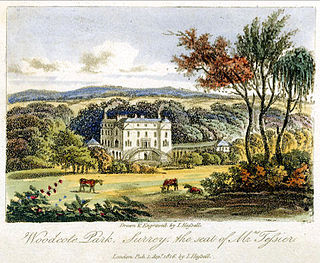
Woodcote Park is a Grade II* listed stately home and estate of about 350 acres near Epsom, Surrey, England, currently owned by the Royal Automobile Club. It was formerly the seat of a number of prominent English families, including the Calvert family, Barons Baltimore and Lords Proprietor of the colony of Maryland. The interior of the house once boasted a gilded library and number of fine murals by notable Italian artists including Antonio Verrio, but most of the historic rooms were removed by the RAC, which had purchased the estate in 1913, and what remained was destroyed by fire in 1934. The present appearance of the house dates from its restoration in 1936. However, the interior of one of the original drawing rooms still survives in the Museum of Fine Arts at Boston, Massachusetts. The estate was used by the military as a convalescent hospital in the First World War and as a training camp in both world wars.
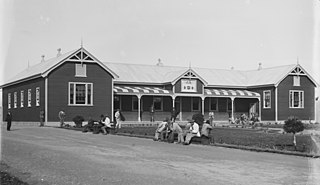
The Seaview Asylum was a psychiatric hospital located to the north of Hokitika, in the West Coast Region of New Zealand's South Island, adjacent to the former Westland Hospital. Open from 1872 to 2009, Seaview trained psychiatric nurses and was once the town's biggest employer.

Horton Hospital, formerly called Horton Asylum, was a large psychiatric hospital in the Horton area of Epsom, Surrey.

St Ebba's Hospital formerly Ewell Epileptic Colony (1904–1918) and later Ewell Mental Hospital (1927–1938) is a mental handicap and former psychiatric hospital near Epsom in the county of Surrey, England.

The Manor Hospital, formerly The Manor Asylum and The Manor Certified Institution was a mental handicap and psychiatric hospital in Horton, near Epsom, Surrey, United Kingdom





























